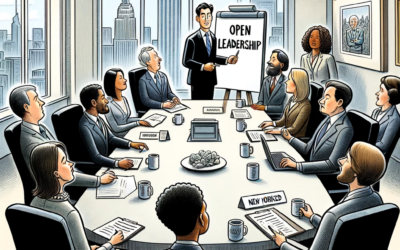This interview with Tim Brown, the chief executive and president of IDEO, was conducted and condensed by Adam Bryant.
Adam Bryant: What were the most important leadership lessons you learned, and how did you learn them?
Tim Brown: My very first professional design job was with this little company in the north of England. And they were an old company, straight out of the Industrial Revolution, that made woodworking machinery. They’d never hired a designer before.
Over six months, I redesigned all of their equipment for this one piece of the company. Toward the end of that, the chairman said: “Hey, Tim, I really like what you’ve been doing while you’ve been here. I want to take you to all our other divisions around England, and I want you to advise the people running those businesses what they should do about design.”
I was 21 or 22 years old. Here was this guy who was chairman of this relatively large company in England, taking the advice of me, this really young person. For some reason, he trusted what I was doing. I was bringing in new ideas, he liked them and he wanted to share them around the company. So I tripped around in his Jaguar for a couple of days and we visited all these factories.
And that for me was a really important learning about how the best ideas or important ideas or new ideas can come from anywhere in an organization. Here I was, kind of the least important person in his company, yet he thought the ideas that I had were interesting enough that he wanted to share them elsewhere.
That is something that I’ve continued to really believe — that you don’t know where the best ideas are going to come from in the organization. So you’d better do a good job of promoting them when they come and spotting them when they emerge, and not let people’s positions dictate how influential their ideas are.
And how does that manifest itself in the way that you run IDEO?
I’ve gone to great lengths to try to encourage what I call an emergent culture at IDEO, where people understand that it’s essentially their responsibility to have good ideas. Not about the work they do every day — we all have to do that — but about new ideas for the company. What are we going to do next? What fields are we going to work in? What are our new big things?
What other important leadership lessons have you learned?
As a design consultant, I get to work with all kinds of interesting people who are leaders of their own businesses. So I constantly learn from watching some of the great leaders do what they do.
A. G. Lafley is a great example. I’ve spent a lot of time with him over the last seven or eight years, until he retired. I’m a member of his design board at Procter & Gamble, and we would get together every four months, and the various divisions would come and show their work.
He was willing to get involved really early on in new ideas — not in a way where his opinion was overly influencing what was happening, but where his support would really push an idea along quickly. I learned a lot from him in terms of style of leadership, which was involved without being dictatorial. He seems to see his role as constantly reminding teams of what they should be focusing on, rather than telling them whether they’ve got the right idea or not.
Somebody else I worked with a lot is Jim Hackett, the C.E.O. of Steelcase. He’s somebody who, no matter how compelling and short-term an issue might be, is always forcing the conversation up to being strategic. How are we thinking about this long term?
As a designer, I’m always looking for solutions to the problems I see in front of me. And the big trick to being a successful designer is always making sure you’re asking the right questions and focusing on the right problems.
It’s very easy in business to get sucked into being reactive to the problems and questions that are right in front of you. And it doesn’t matter how creative you are as a leader, it doesn’t matter how good the answers you come up with. If you’re focusing on the wrong questions, you’re not really providing the leadership you should.
Can you talk more about that?
I do think that’s something that we forget — as leaders, probably the most important role we can play is asking the right questions. But the bit we forget is that it is in itself a creative process. Those right questions aren’t just kind of lying around on the ground to be picked up and asked.
When I go back and look at the great leaders — Roosevelt, Churchill — one of the things that occurs to me is they somehow had the ability to frame the question in a way that nobody else would have thought about.
In design, that’s everything, right? If you don’t ask the right questions, , then you’re never going get to the right solution. I spent too much of my career feeling like I’d done a really good job answering the wrong question.
And that was because I was letting other people give me the question. One of the things that I’ve tried to do more and more — and I obviously have the opportunity to do as a leader — is to take ownership of the question. And so I’m much more interested these days in having debates about what the questions should be than I necessarily am about the solutions.
But answers are often rewarded more than questions, right?
That was one of the things that used to make me feel very, very insecure as a business leader — thinking: “Am I supposed to have all the answers? Because I know I don’t.” Then I finally came to realize, well, nobody else has all the answers, either. It’s just that somehow we’ve got this culture of having the answers. It’s partly the media, you know, and some sort of self-image that business leaders have. And partly it’s about trying to convince the stock market that things are all fine. It’s all of these things added together.
To some degree, it’s a cultural thing here in America. It’s a little different when you go to other parts of the world. But I’m personally perfectly comfortable admitting that I don’t know the answers and that I’m more interested in the questions anyway.
What have you learned to more of, or less of, over time?
Read the remainder at New York Times




